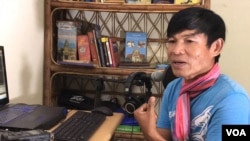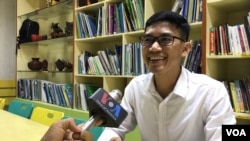The last week of July was an exercise in contradictions.
While the Cambodian government appointed several dozen journalists to be advisors to the Ministry of Information, two of their peers – former Radio Free Asia reporters Uon Chhin and Yeang Sothearin – were facing trial in a Phnom Penh courtroom, after the same government accused them of espionage.
The two journalists are facing espionage charges for allegedly providing a foreign government with information, as well as a farcical pornography charge, with a verdict due on August 30. Uon Chhin and Yeang Sothearin used to work for U.S.-funded Radio Free Asia (RFA) before it ended in-country operations on September 14, 2017, during a wider crackdown on the free press.
The former RFA staffers were arrested in November 2017, sent to Phnom Penh’s overcrowded and under resourced Prey Sar prison, before being released on bail in August 2018. For them, the ten months in prison was “hell.” If found guilty on August 30, the duo likely will return to Prey Sar and could face up to 15 years.
A guilty verdict with a suspended sentence is another possible result, some observers say.
“When I was in prison, the first thing I thought about was my family and my little baby girl, who needed me to take care of her,” said Uon Chhin last week, unable to hold back tears.
Prosecutors have accused the two reporters of reporting news stories for RFA even after the broadcaster announced the closure of its Cambodian bureau. Uon Chhin and Yeang Sothearin have denied wrongdoing, saying any stories sent to RFA was only until the end of their contacts. Their defense lawyers said that the stories were in the public domain and clearly did not contain any secrets or information detrimental to national security.
Rights groups have characterized the charges as a blatant attack on the free press. In June, Human Rights Watch called the charges ludicrous and politically motivated and the Committee to Protect Journalists have called for the charges to be dropped.
The two journalists were caught in a government crackdown that targeted the political opposition, civil society and grassroots groups, and independent media organizations. At the same time, The Cambodia Daily was forcibly shutdown after being asked to pay an exorbitant tax bill and more than 30 radio frequencies, which carried RFA and VOA Khmer programing, were taken off the air.
In May 2018, the Phnom Penh Post faced a similar tax bill and was taken over by business interests linked to Prime Minister Hun Sen. Other journalists have been jailed and imprisoned, with authorities expressing little tolerance for dissenting views.
“It was the loss of media institutions that contributed to Cambodia's press freedom,” Yeang Sothearin said.
“It was also the loss of the media as a watchdog that sent messages to government about what was happening at the local level.”
Following their release, life has been hard for both Uon Chhin and Yeang Sothearin, they told VOA Khmer this past week. The conditions of their bail require them to visit the local police station every month and deposit their passports with the court. These conditions and the lingering charges have made it hard for both to find jobs.
“After RFA was closed, I tried to find a job to continue my journalism career,” Yeang Sothearin said. “I cannot find one yet. Unfortunately, Uon Chhin and I have had bad luck and we have lost our chance [to work as journalists].”
Uon Chinn, who used to work as a primary school teacher before taking up journalism, has found it hard to find a steady job, whereas Yeang Sothearin has been able to find some work at a local NGO. The two are now awaiting the court verdict on August 30, knowing that an acquittal could give their journalistic careers a fresh start.
“If the August 30 verdict gives us justice and acquits us, Yeang Sothearin and I will regain our full freedom like other people, and we hope to find a chance to become journalists again,” said Uon Chhin.









